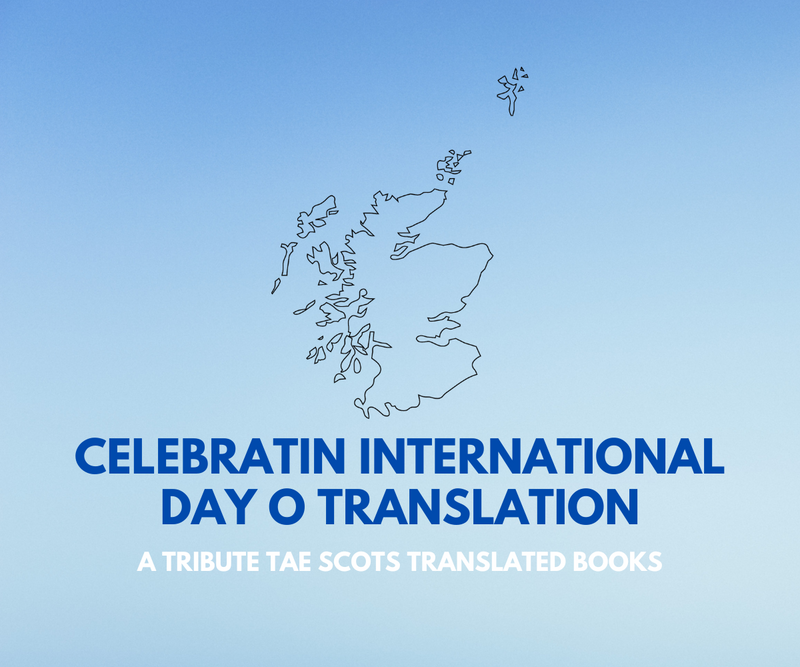Celebratin International Day o Translation
A Tribute tae Scots Translated Books

A Tribute tae Scots Translated Books
Aye, it’s that time o year again when we come thegither tae celebrate the art o translation, an on this International Day o Translation, we’re gaun tae shine a light on the wonderful Scots translated books that bring the rich tapestry o our culture tae life.
Translations arenae just about convertin words fae yin language tae anither. They’re aboot conveyin the feelin, spirit, an essence o a piece o wark. Thro translation, we can share oor Scots stories wi a global audience, connectin hearts an minds across borders. It’s a bridge that allows oor voices tae resonate wi folk far and wide.
_______________________________
It’s only fitting we shine a light on a gem o a book that has touched the hearts o many: The Laddie, the Mowdie, the Todd an the Cuddie, translated intae Scots by the talented Matthew Fitt. This Scots version is based on Charlie Mackesy’s beloved tale, The Boy, the Mole, the Fox and the Horse, which has inspired millions o readers an viewers across the globe.
At the core o this story lies the beautiful journey o friendship and self-discovery. The narrative follows a laddie, a mowdie (mole), a tod (fox), and a cuddie (horse) as they navigate life thegither. Through their adventures, they explore what it means tae find hame and feel loved. The line “Hame isnae ayewis a place, eh no?” resonates deeply, reminding us that hame is whaurver we feel accepted and cherished.
Matthew Fitt has masterfully translated Mackesy’s warm and poignant prose intae Scots, capturing the essence o the original while makin it accessible tae a new audience. The language flows like a gentle stream, filled wi Scots idioms and expressions that bring the characters tae life in a way that feels authentic and relatable.
The accompanying animated short film, released on Christmas Day, takes Charlie’s soothing illustrations and brings them tae life in full colour. The film, which has won BAFTA and Oscar accolades, features a stellar cast including Tom Hollander as the Mowdie, Idris Elba as the Todd, Gabriel Byrne as the Cuddie, and newcomer Jude Nicoll as the Laddie. This adaptation adds a lovely new dimension tae the tale, inviting viewers into a world where kindness and friendship reign supreme.
As we celebrate International Day o Translation, let’s take a moment tae appreciate the power o words and the magic o translation. The Laddie, the Mowdie, the Todd an the Cuddie is a perfect example o how stories can transcend languages, connect cultures and bring comfort tae our hearts. If ye havenae yet explored this delightful Scots translation, now’s the time!
_______________________________

Last year, the Scottish Language Awards bestowed the prestigious Scots Book o the Year title upon Animal Fairm, translated intae Scots by Thomas Clark. As we delve into this classic work, it’s clear that its themes o power, equality, an corruption resonate deeply, now mair than ever.
When George Orwell first published Animal Farm, he created a tale that transcended time, speakin to the struggles for freedom and equality. The story follows the animals o Manor Fairm, who rise up against their human owner, Mr. Jones, in the hope o creatin a fairer, more equal society. However, as the pigs Napoleon and Snawbaw gain power, the harsh truth emerges: "Aw animals are equal, but some animals are mair equal than ithers."
This line haunts the narrative, revealin the dark irony o revolutions that promise equality but ultimately lead tae new forms o oppression. In the Scots translation, Thomas Clark captures the spirit o Orwell’s satire while makin it accessible for a wider audience.
The translation brings a fresh perspective tae a well-known tale, allowing Scots speakers tae engage wi the narrative in their own leid. Clark’s choice o words and expressions breathes new life intae the characters and their struggles, makin the socio-political commentary even mair poignant.
As we celebrate the Scots translation o Animal Fairm, let’s acknowledge the importance o language in preserving and sharing our cultural narratives. Thomas Clark’s translation is not just a linguistic conversion; it’s a reimagining that maintains the essence o Orwell’s message while speakin directly tae the hearts and minds o Scots speakers.
The recognition o this work at the Scottish Language Awards highlights the significance o Scots literature in our collective identity. It encourages us tae engage with our past, reflect on our present, and consider the future we wish tae create.
So, gather yer pals, pick up a copy o Animal Fairm and immerse yersel in the words that challenge us tae think critically about the world we live in. Here’s tae the legacy o Orwell, the brilliance o Thomas Clark and the vibrant Scots language that brings this story tae life anew!
_______________________________
 Aeschylus’ Agamemnon in Scots by William Imray, introduced by Alan Riach
Aeschylus’ Agamemnon in Scots by William Imray, introduced by Alan Riach